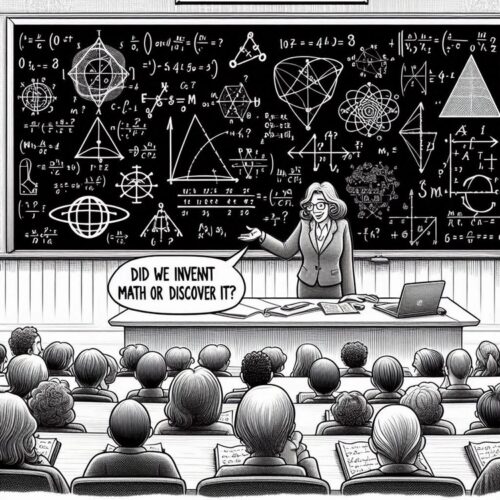The Kalam Cosmological Argument: A Case For God
EVERYTHING THAT BEGINS TO EXIST HAS A CAUSE…
Exploring the Cosmic Origins of Existence
What lies beyond the farthest reaches of space and before the birth of time itself? This profound existential question has captivated philosophers and scientists across epochs and cultures. The Kalam cosmological argument beckons us to peer beyond the misty veil of the Big Bang and contemplate the ultimate metaphysical reality: the origin of the entire universe from literally nothing.
In this metaphysical odyssey tracing backward through cosmic history, we encounter signs that may unmistakably point towards a transcendent, supernatural source of all reality—an eternally existent, omnipotent Creator. This ancient argument, first developed by medieval Islamic thinkers, rests on three deceptively simple premises that carry seismic implications.
Arising from medieval Islamic philosophy, this ancient argument offers three powerful, yet simple, premises that have reverberated down the ages like the voice of a wise prophet:
- Everything That Begins to Exist Has a Cause
- The Universe Began to Exist
- Therefore, the Universe Has a Cause
Sceptics point to the diversity of beliefs and rampant non-belief, and ask: if God truly exists, and His existence is that obvious, why are there all these varied responses? Or why doesn’t everyone recognize God as the universe’s first cause?
The multitude of our views about, and responses to, God doesn’t necessarily prove the non-existence of God. While we may all have an innate awareness of God’s existence, we each respond to this awareness in our own ways. Buried within the multiplicity of religions and philosophies, we consistently find core tenets hinting at something transcendent–a belief in realms beyond the physical, the existence of moral codes, an awareness of human sinfulness, a search for purpose and meaning. Even those professing atheistic worldviews wrestle with life’s biggest metaphysical questions.
The Christian may also remind the sceptic of Blaise Pascal’s suggestion that there’s a God-shaped vacuum in each of us that only the real God can fill, and the pretenders can’t. No pursuit of idols, or wealth, or power, or pleasure can ultimately fill this vacuum. Till we come to Him, we have a nagging sense there is something more to existence, some transcendent meaning and purpose we were created for, but are yet sadly missing.
Conclusion: The Implications of the Kalam Cosmological Argument
From the premises of the Kalam Cosmological Argument, a stunning conclusion emerges: the existence of an eternal, necessary, and immensely powerful First Cause or Creator. This First Cause is beyond the physical and temporal universe, existing independently and uncaused. Such a being is fundamentally different from the dependent, finite world we experience.
The Kalam offers a clear philosophical path to understanding God’s existence and essential attributes. It suggests an unimaginably great, eternal, simple, uncaused, supernatural, and incredibly powerful Source that is radically distinct from our finite cosmos. This conclusion may seem astonishing, but it leads us to the idea of a Supreme Reality—one that supports the entire structure of material existence. This reality is what we fittingly call God.
The Kalam presents a logical and straightforward explanation for the mysteries of the universe’s origin. For those open to exploring these profound questions, the argument offers a strong case for God’s existence, encouraging deeper philosophical and existential reflection. At the very least, the Kalam points us towards the vast, unexplored realms of existence, prompting us to consider the infinite mysteries that lie beyond our physical reality.
Related Reads:
- The Ontological Argument: Can We ‘Logic’ Our Way to God?
- Aquinas’ Quinque Viae: Timeless Arguments for the Existence of God
- The Universal Moral Oughts: Signposts to the Divine
- The Teleological Argument: Unveiling Design in a Universe of Wonder
- The Fine-Tuning Argument: Can Orchestras Compose and Conduct Themselves?
Editor's Pick

Ephesians 1:13: Was the Spirit’s Indwelling Promised of Old?
When Paul declares believers are “sealed with the promised Holy Spirit” in Ephesians 1:13, one word jumps off the page: [...]

Monergism vs Synergism: Is Salvation God’s Work Alone?
When God saves us, does He do it alone, or does He need our help? The question isn’t mere theological [...]

Was Jesus Abandoned by the Father on the Cross?
WHY WE ANSWER IN THE NEGATIVE “My God, my God, why have you forsaken me?” These words from the cross [...]

Why Do Some Respond to God’s Call While Others Don’t?
THE REFORMED VIEW ON OUTWARD AND INWARD CALLS EXPLAINED Picture this: Two neighbours attend the same church service. They hear [...]

Does Ocean Salt Content Prove a Young Earth?
A COMPELLING LOOK AT MARINE CHEMISTRY AND EARTH’S TIMELINE The Salt Question That Challenges Deep Time: If Earth’s oceans have [...]
Noah’s Flood: Where Did All the Water Come From? And Go?
The question hits every Bible-believing Christian at some point: “If Noah’s flood covered the whole earth, where did all that [...]

No Marriage in Heaven? What Does Mark 12:25 Mean?
“Will I see my spouse in heaven? Will we still be married?” These questions pierce the heart of every Christian [...]

The Terror of Meeting God: What Isaiah 6 Reveals About Divine Holiness
WHEN ‘WOE IS ME’ IS THE ONLY PROPER RESPONSE TO A GLIMPSE OF GOD Picture this: You’re a prophet of [...]

Is the Holy Spirit Present in Unbelievers? The Biblical Answer
Can someone who doesn’t believe in Jesus Christ have the Holy Spirit living inside them? This question strikes at the [...]

The Gap Theory Exposed: Why Embrace a Young Earth?
The Gap Theory proposes there’s a vast time gap—millions or billions of years—between Genesis 1:1 (“In the beginning God created [...]
SUPPORT US:
Feel the Holy Spirit's gentle nudge to partner with us?
Donate Online:
Account Name: TRUTHS TO DIE FOR FOUNDATION
Account Number: 10243565459
Bank IFSC: IDFB0043391
Bank Name: IDFC FIRST BANK







